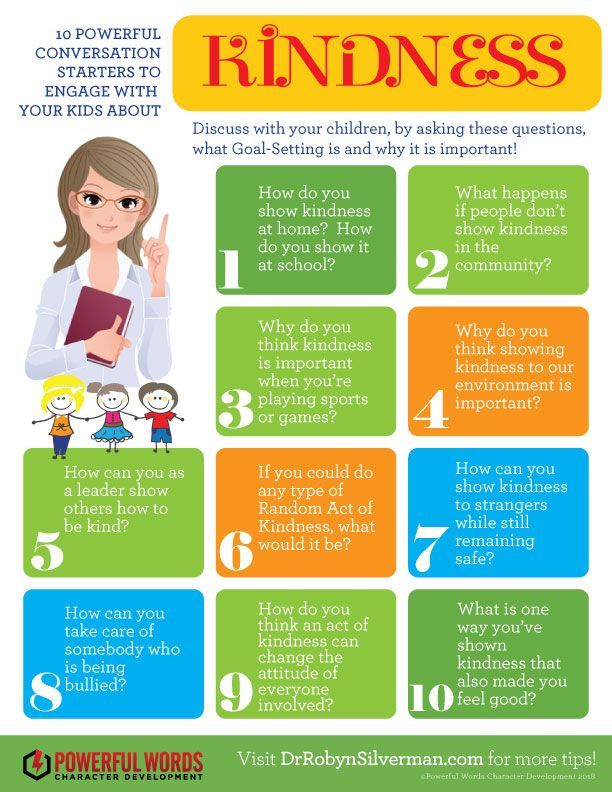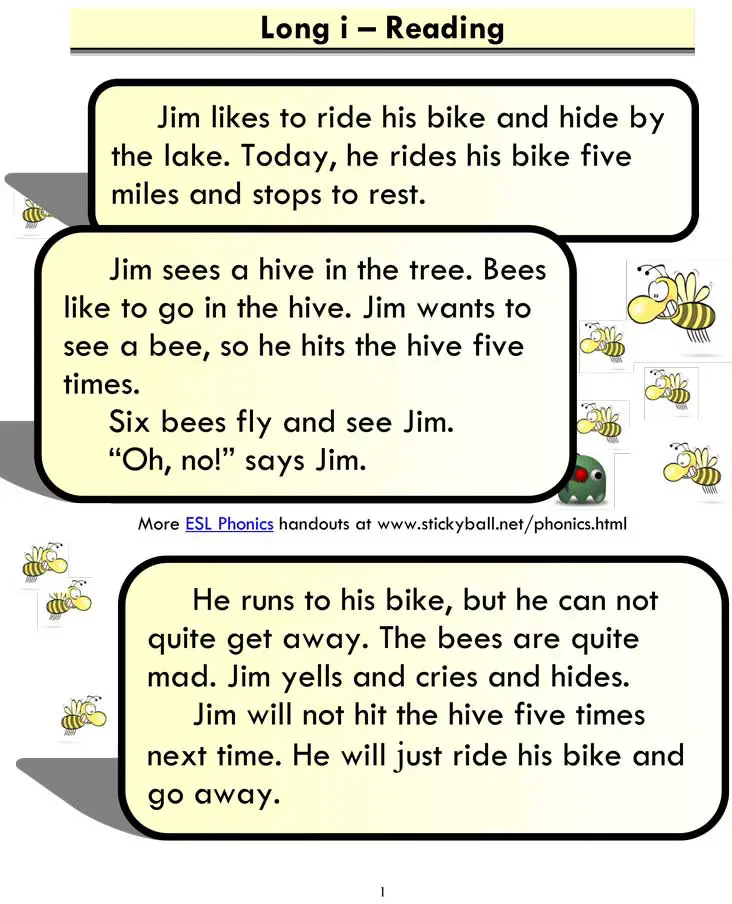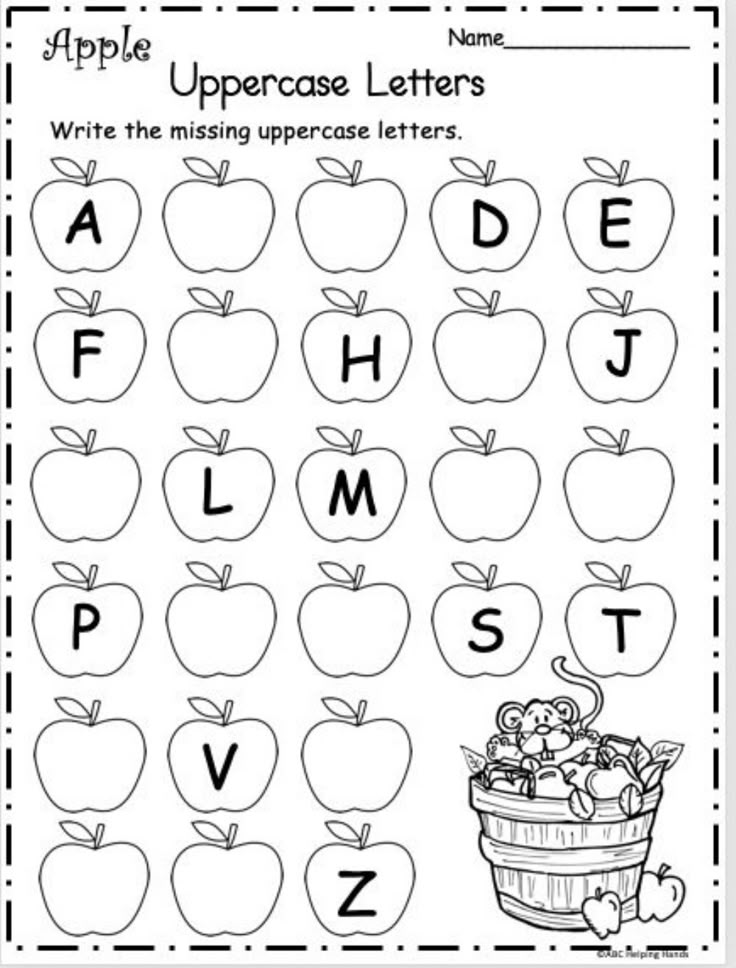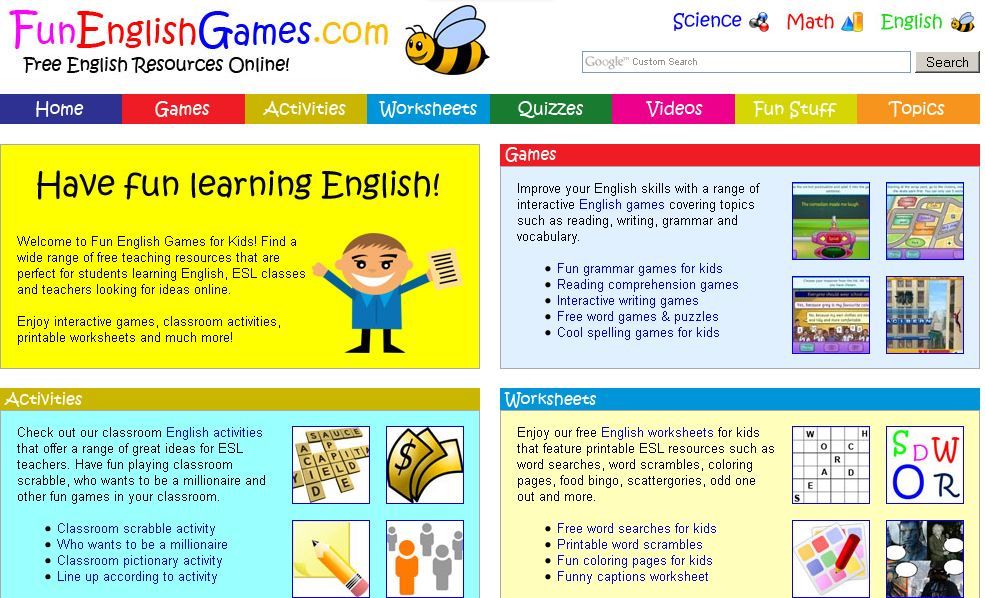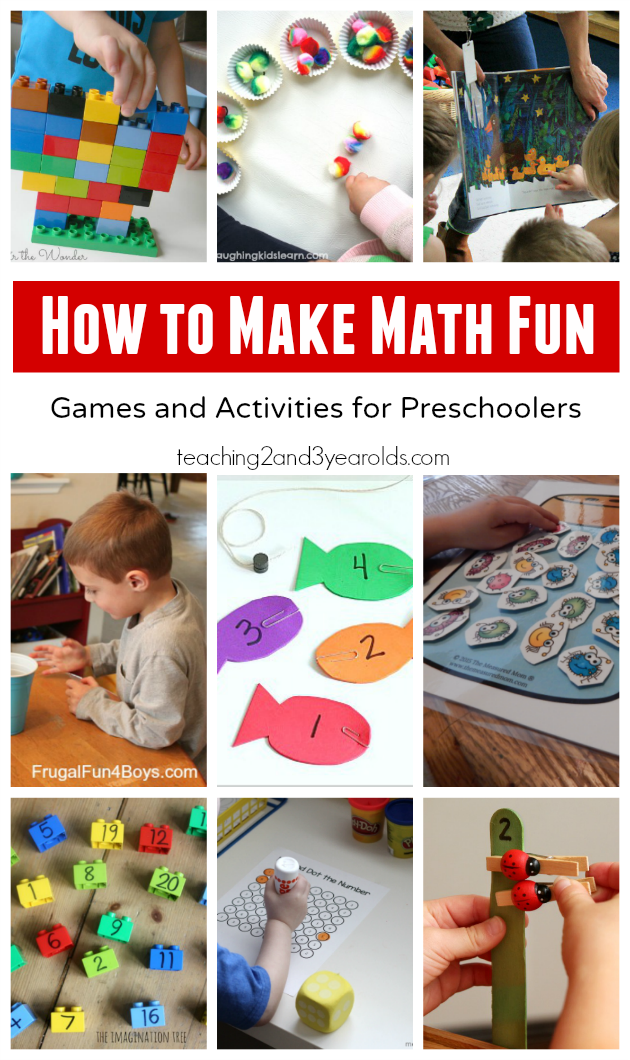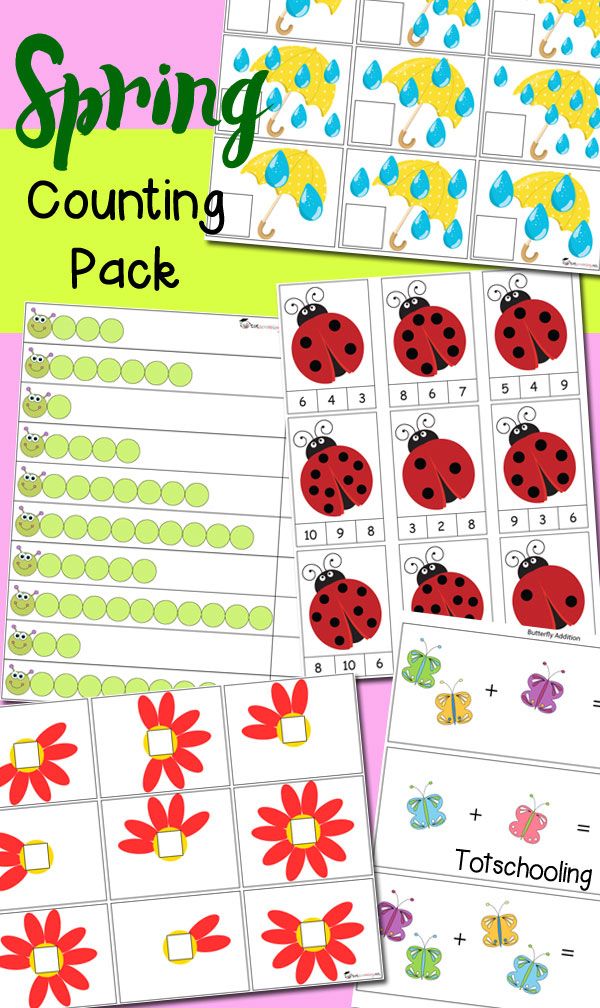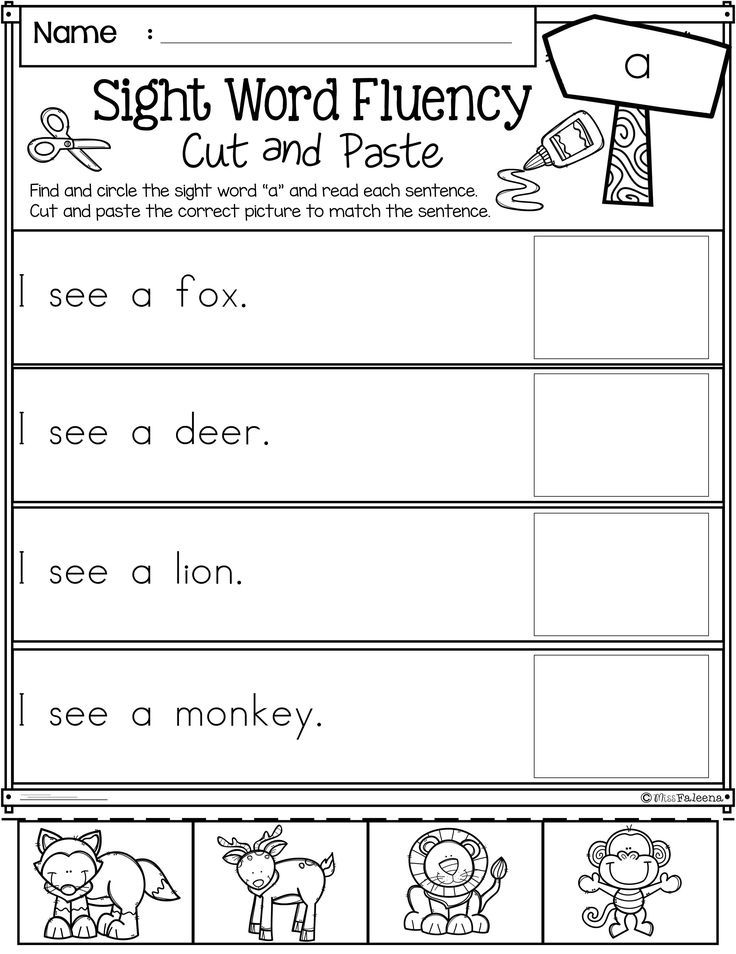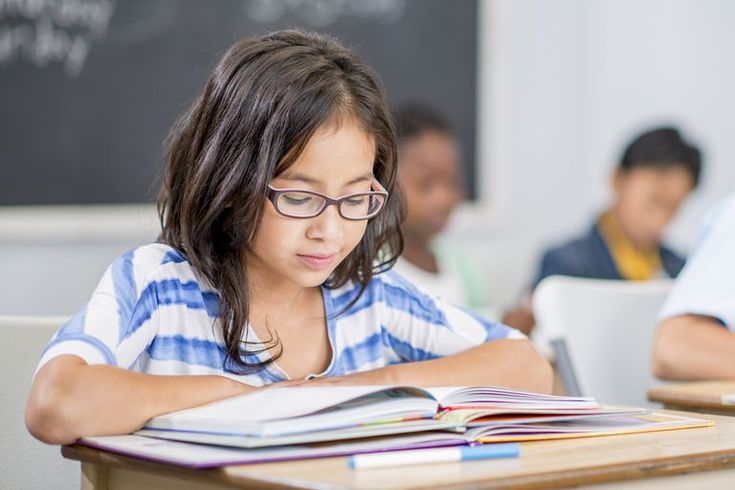Ways to show kindness for kids
100 Acts of Kindness for Kids
Doing acts of kindness is one of the best activities you can do with your kids.
It’s a great way to bond as a family, a lot of fun and teaches kids about compassion and service.
Any act of kindness no matter how big or small can make a difference–especially when done intentionally.
Here are 100 acts of kindness for kids that you and your family can do together!
100 Acts of Kindness for Kids
- Put change in a vending machine.
- Hold the door open for someone.
- Do a chore for someone without them knowing.
- Tell a joke.
- Return someone’s cart at the store.
- Give candy to your bank teller.
- Leave a letter in a library book.
- Feed the birds.
- Leave happy notes around town.
- Put a small bin in your car to collect recycling.
- Call your grandparents and ask them about their childhood.
- Pick up litter.
- Let someone go ahead of you in line.
- Compliment a friend.
- Wash someone’s car.
- Write a thank you note for your mail carrier.
- Plant something.
- Bake dessert for a neighbor
- Walk dogs at the animal shelter.
- Check in on an elderly neighbor.
- Set up a lemonade stand and donate the profits.
- Send a card to a service member.
- Bury treasure at the playground.
- Set the table for dinner.
- Leave bubbles on someone’s doorstep.
- Put money on a stranger’s layaway bill.
- Tell someone why they are special to you.
- Donate outgrown clothes.
- Buy a coffee for a stranger.
- Pass out stickers to kids waiting in line.
- Talk to someone new at school.
- Write chalk messages on the sidewalk.
- Weed or shovel for a neighbor.
- Donate food to the food pantry.
- Bring flowers to your teacher.
- Tell a manager how good your service was.
- Tape change to a parking meter.
- Donate socks and supplies to the homeless shelter.
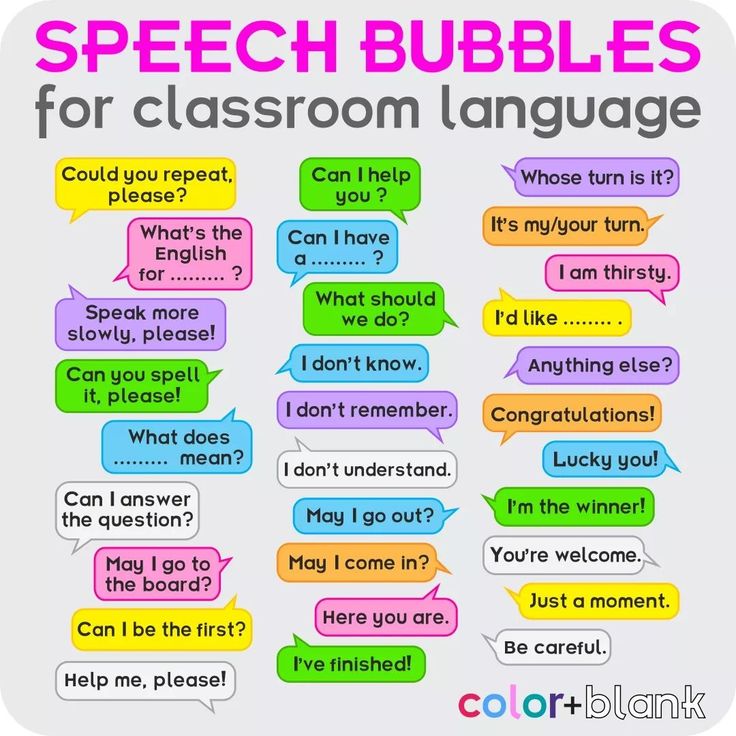
- Give a lottery ticket to a stranger.
- Call a friend you haven’t seen in a while to say hello.
- Tape money for the ice cream truck to a friend’s front door.
- Take treats to the fire station.
- Read a book to someone.
- Leave heads up pennies on the sidewalk.
- Donate a book to a doctor’s office waiting room.
- Tell someone how much you love them.
- Say hello to everyone you see.
- Make someone else’s bed.
- Hold the door open for someone.
- Wave at kids on school buses.
- Sing songs at a nursing home.
- Invite someone to play on the playground.
- Tell the principal how great your teacher is.
- Donate a toy to Toys for Tots.
- Turn off the water while brushing your teeth.
- Say thank you when you see service members.
- Fill a kindness jar with candy for another family.
- Make a thank you sign for sanitation workers.
- Make a busy bag for a family with young children.
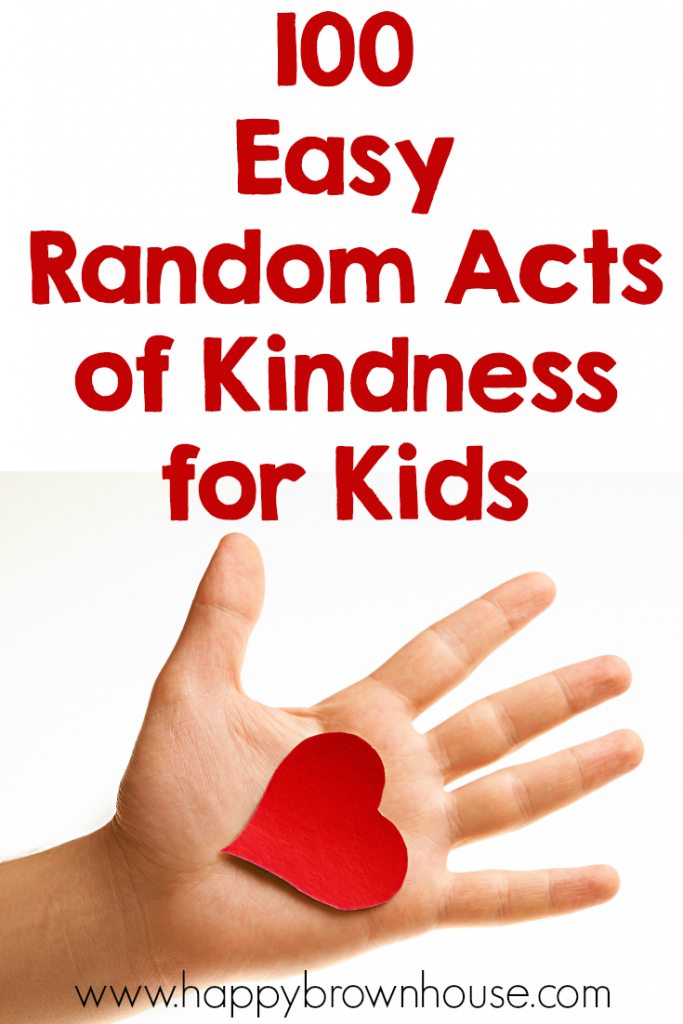
- Bring cookies to the custodian.
- Help make dinner.
- Donate new pajamas for foster kids.
- Make a get well card for someone.
- Bring your neighbors’ garbage cans up for them.
- Take care of someone’s pet while they’re away.
- Leave a popcorn surprise on a DVD rental machine.
- Share a special toy with a friend.
- Clean up your room without being asked.
- Tape a video message for faraway friends.
- Leave kindness stones at the park.
- Give a candy bar to the bus driver.
- Send dessert to another family at a restaurant.
- Give spare change to the food pantry.
- Buy extra school supplies for a teacher.
- Make muffins for your pharmacist.
- Teach someone something new.
- Reuse paper when you are drawing.
- Pay for someone’s toll.
- Give someone a hug coupon.
- Volunteer at a soup kitchen.
- Write a note for someone’s lunch.
- Collect money or items for your favorite charity.

- Donate coloring books and crayons to the children’s hospital.
- Write a poem for a friend.
- Ask for donations instead of birthday gifts.
- Help someone unload groceries at the store.
- Make a candy gram for the police department.
- Collect books for the library.
- Adopt an animal online.
- Decorate tissue boxes and hand sanitizer for nursing stations.
- Make a homemade gift for someone.
- Clean up your toys without being asked.
- Deliver water bottles to the homeless shelter.
- Create activity bags for families of deployed soldiers.
- Give high fives to a friend.
- Make a thank you card for your librarian.
- Dry the slides at the park with a towel after it rains.
- Make play dough for a preschool class.
- Send a postcard to a friend.
- Smile at everybody. It’s contagious.
Print Your Own 100 Acts of Kindness
Ready to get started?
Yay!!!!
Download the 100 acts of kindness printable below and print it out for your kids (or self!)
Then choose a few from the list and get started.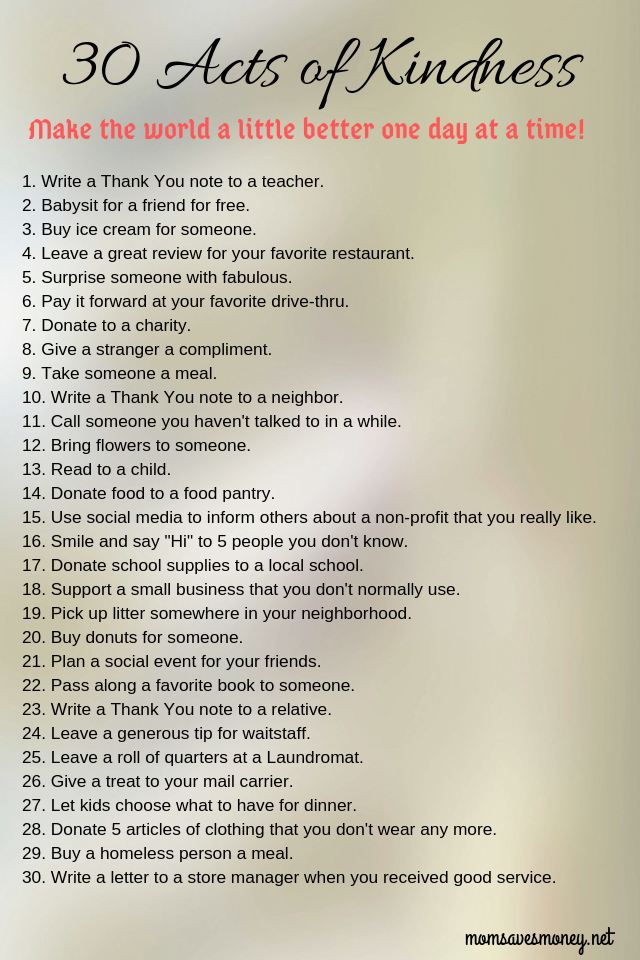 Remember no act of kindness is ever too small!
Remember no act of kindness is ever too small!
DOWNLOAD HERE: 100 ACTS OF KINDNESS FOR KIDS FREE PRINTABLE
The best part about doing acts of kindness is once you start you can’t stop! They are so much fun to do!
Focusing on kindness can be life-changing for you and your family. We think doing acts of kindness as a family or group can be life changing and encourage you to join our kindness movement.
We share kindness ideas year round and encourage you to sign up for our emails or follow us on Instagram so you don’t miss any!
Join the Acts of Kindness Movement
We also help lead world-wide kindness efforts throughout the year we’d love for you to join. Read about each below and get involved with going good!
Countdown to Christmas with Acts of Kindness
Each year we share a Christmas kindness advent calendar readers can use to do a little good as the holidays approach. We have TONS of resources and lots of fun (and many free) kindness ideas for you to do.
We share a December version for those who aren’t counting down to Christmas and even have a RACK printable pack you can use to create a personalized calendar for your family!
Use this post to get you started: Random Acts of Christmas Kindness Advent Calendar
100 Acts of Kindness Project
Each year from Martin Luther King Jr.’s birthday until Valentine’s Day we join with Toddler Approved to do a 100 Acts of Kindness challenge!
This is a wonderful way to kick off the year and is very popular with families and classes. We provide lots of resources and ideas and even have a Facebook group full of participants cheering each other on from around the world.
Use this post to find out more: Join the 100 Acts of Kindness Project
Want even more acts of kindness ideas for kids?
No problem! We’ve got lots of acts of kindness ideas that kids can do. You’re never too young to make a difference!
60 Acts of Kindness for Kids to Do in 2022
Kids may be little, but they can make a big difference in the world by performing these simple acts of kindness.
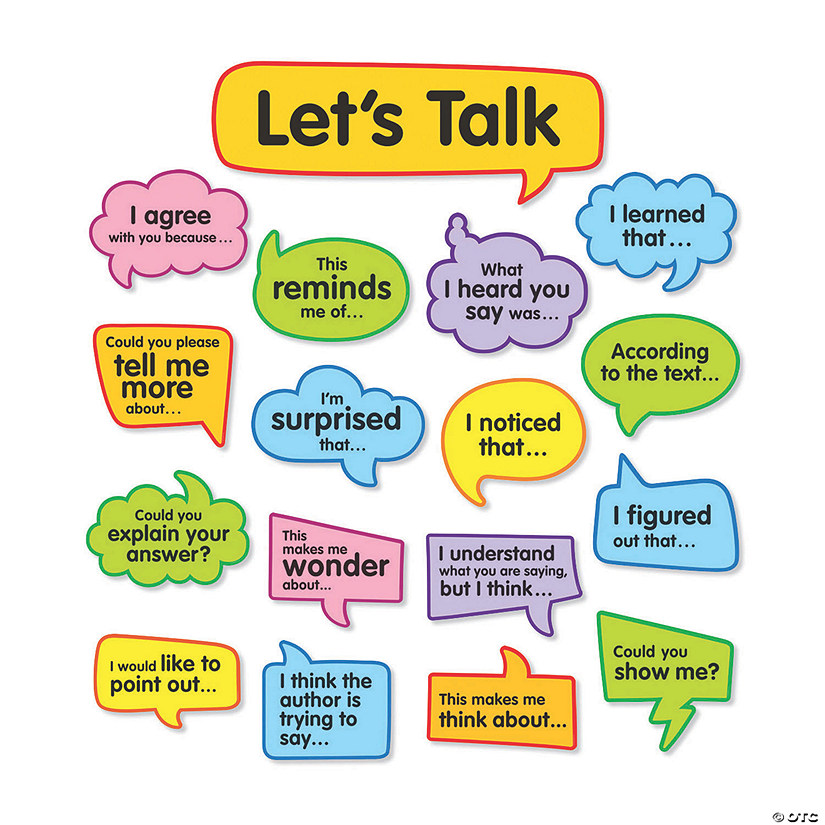
Random acts of kindness may sound simple, but they’re almost a revolutionary act in our world. Showing kindness requires courage, honesty, and thinking outside the box. It’s so worth it, though, to see the look of appreciation and delight on the recipient’s face. These small acts of service and random acts of kindness for kids can make a huge difference, for both the giver and the receiver. And that’s true whether you’re nine or 99.
Children are naturals when it comes to performing little acts of kindness. In fact, many of us adults take our cues from them! But sometimes kids need a little extra nudge to think about others. Whether it’s showing kindness to their families, friends, communities, animals, or the planet, we’ve got thoughtful ideas for kindhearted kiddos of every age. We’ve also got plenty of kindness memes and kindness quotes to put you in the right frame of mind.
Random acts of kindness for family
Send a get-well card
Have your child make and send a get-well card to a loved one who isn’t feeling well, or make a batch to drop off at the local hospital.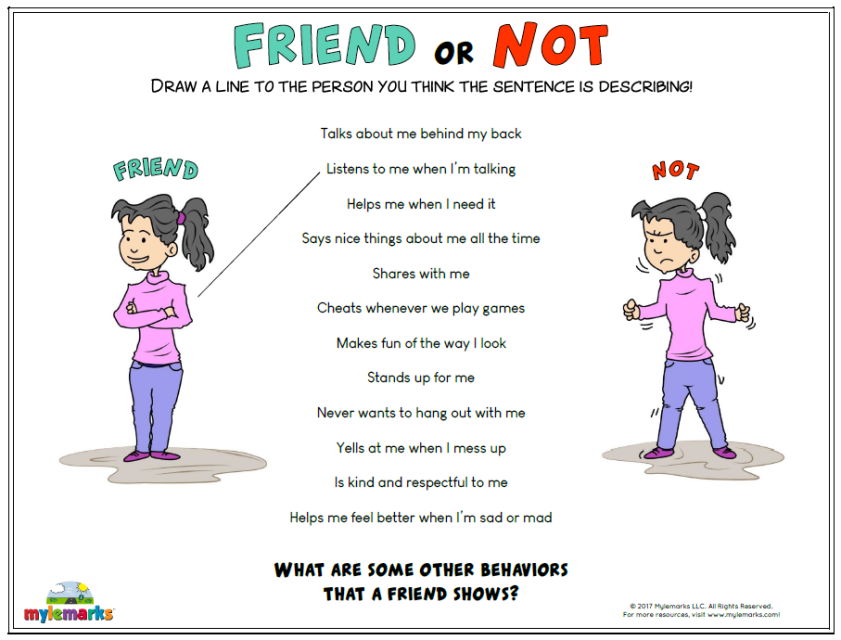 Little artists will particularly love doing this one! Check out these sweet get well wishes you can add onto a message or a card for a loved one.
Little artists will particularly love doing this one! Check out these sweet get well wishes you can add onto a message or a card for a loved one.
Text someone a funny meme
Are you always telling your kid to get off their phone? Put their love of tech to good use by having them text a funny meme to a family member. (Just make sure it’s appropriate!) It’s a quick way to put a smile on someone’s face.
Give someone a compliment
Learning how to give a kind, sincere compliment is a skill—and now is the perfect time for your child to practice. Start with one of these little compliments you should be giving every day.
Do a chore for a sibling
Doing a small chore for a brother or sister is an easy way to show kindness, particularly if they are having a bad day. It can also increase that loving sibling bond.
Fly View Productions/Getty Images
FaceTime a grandparent
Nothing cheers up a grandparent like seeing the sweet face of their grandchild.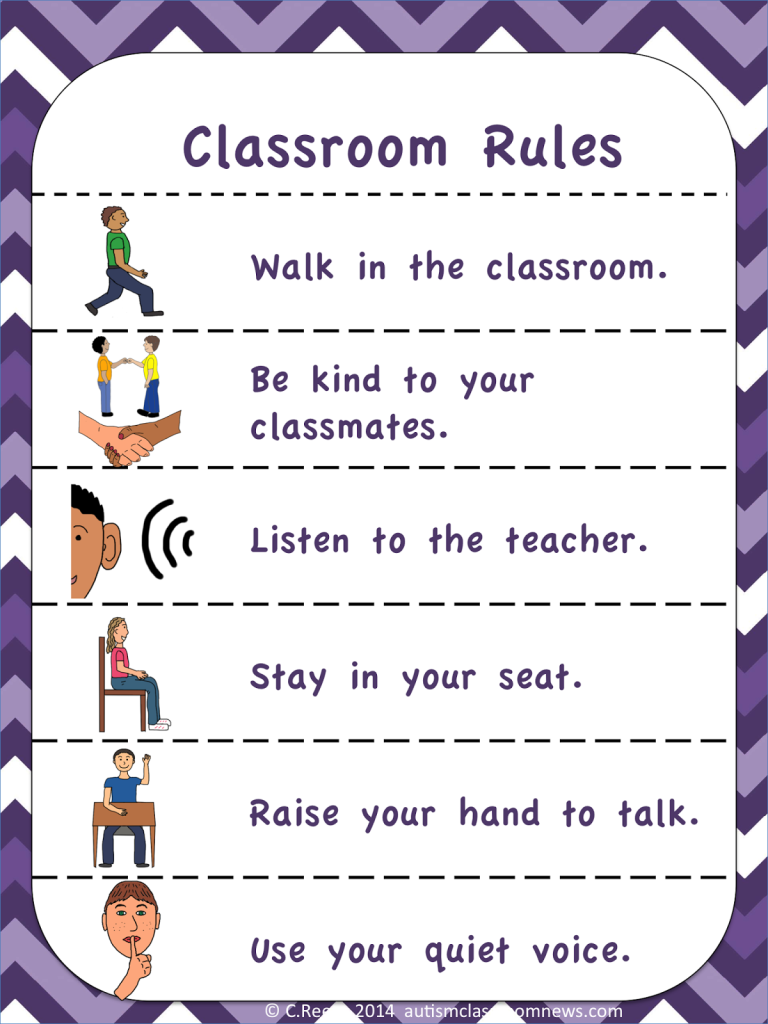 Littles already love calling, but it may feel even more meaningful coming from an older child or teen.
Littles already love calling, but it may feel even more meaningful coming from an older child or teen.
Walk the dog
If you have a dog, encourage your child to take it on walks. If you don’t own one, offer to walk the dog of an elderly relative, a disabled neighbor, or a friend who’s out of town.
Make a family member’s bed
Making someone’s bed is a small kindness that can make a big difference in their day. Kids can add a note or small piece of candy on the pillow to make it extra special.
gradyreese/Getty Images
Read a book to a sibling
The “reader” will love being able to share a favorite book, and the listener will enjoy the attention along with the story. Parents will love that it helps kids practice their reading skills.
Put away groceries
Children of all ages can learn about household management and show kindness to their parents by helping to shop for groceries, bring them in from the car, and put them away properly.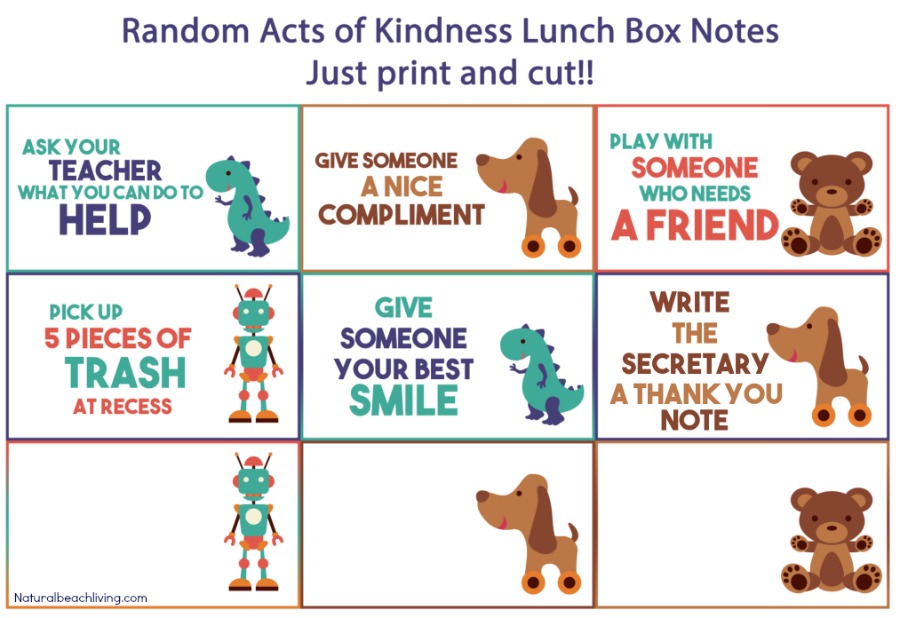
Offer to be a “mother’s helper” for an hour
Many kids love to help but aren’t old enough to babysit on their own. One solution is to allow your child to volunteer as a mother’s (or father’s) helper for you or a close loved one. The adult is still present, but the child can do small chores and play with younger children to help keep them busy.
Yuji Arikawa/Getty Images
Give a hug to Mom or Dad
A hug from your child is the ultimate kindness! It shows they are thinking about you and they love you.
Organize the plastic containers
Is your Tupperware cabinet a mess? Even very young children enjoy stacking containers and matching things by size and shape. Older kids love organizing things, especially when they get to do it their way, so encourage creativity.
Refill the pet’s water dish
Another way to show kindness and love to animals is to make sure their needs are met. They can’t speak for themselves, so teach your child to regularly check your pet’s food and water bowls—or maybe even clean out the litter box!
BFG Images/Getty Images
Play a board game with a sibling or grandparent
Kids love to play all sorts of games, like board games, card games, and even brain-boosting games.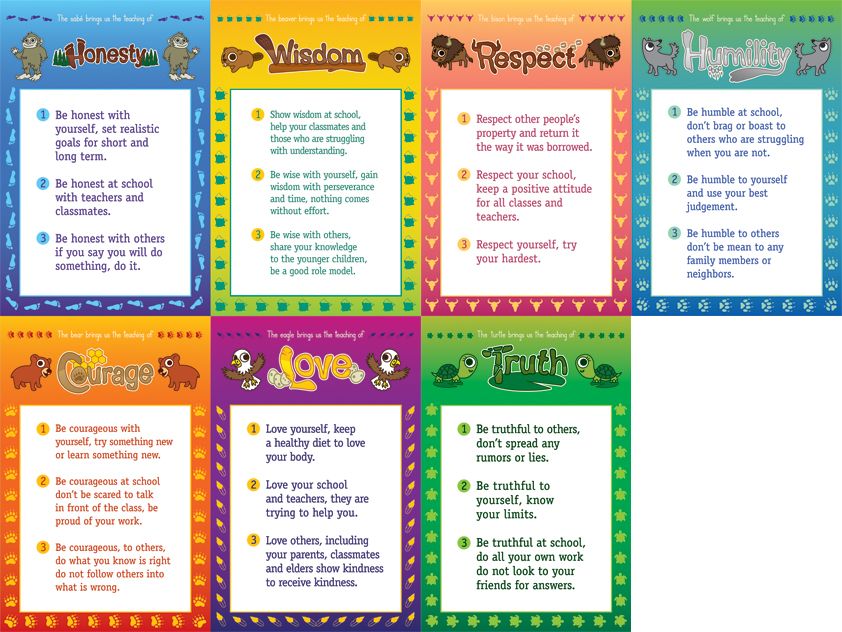 Use this natural desire for fun and have them reach out to a sibling, a grandparent, or anyone else who could use some extra love.
Use this natural desire for fun and have them reach out to a sibling, a grandparent, or anyone else who could use some extra love.
Post a picture of something they are grateful for
Kids can show gratitude for their blessings and kindness to others by taking a picture of something beautiful or happy in their lives and either posting it to social media or texting it to a loved one.
Help cook dinner
Children of all ages love helping out in the kitchen. Let them plan and cook a simple age-appropriate meal or work alongside you. As their skills and confidence grow, so will their ability to provide this kindness in the future.
Random acts of kindness for friends
Write to a pen pal
Writing via paper or electronically to a pen pal in another place is a great way for kids to learn social skills, learn about other cultures, and practice writing. Talk to your child’s teacher or a local community center, or participate in the Flat Stanley project.
Kinga Krzeminska/Getty Images
Make a friendship bracelet
Do a kindness craft with letter beads, spelling out a sweet message like “I love you,” “Best friend,” or “Peace.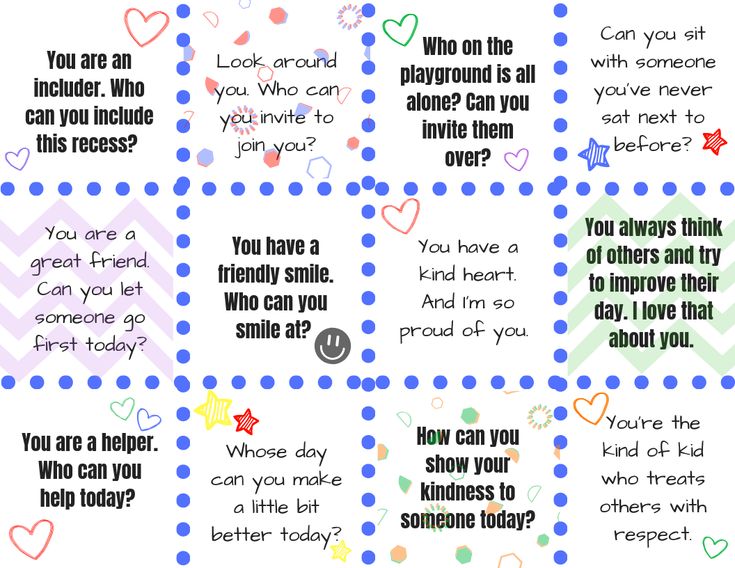 ” Kids can make a bracelet to wear and one to share with a new friend or a family member.
” Kids can make a bracelet to wear and one to share with a new friend or a family member.
Leave five kind comments on social media
Everyone loves getting happy messages on social media, so this is an easy random act of kindness for kids to try. Older kids with social media accounts can like and leave a positive, supportive comment on a friend or family member’s post. Encourage them to reach outside of their normal circle (safely) to include others who may be feeling ignored or left out. As always, monitor your children’s social media activity closely.
Make a friend laugh
Kids can spread joy to their friends by telling a funny joke or sharing a hilarious pun. Let the laughter commence!
Rawpixel/Getty Images
Share toys
Sharing is caring, after all! Encourage your kids to share toys with their friends so everyone can join in on the fun.
Pick a dandelion for a friend
This small but sweet gesture allows kids share something special with their friends.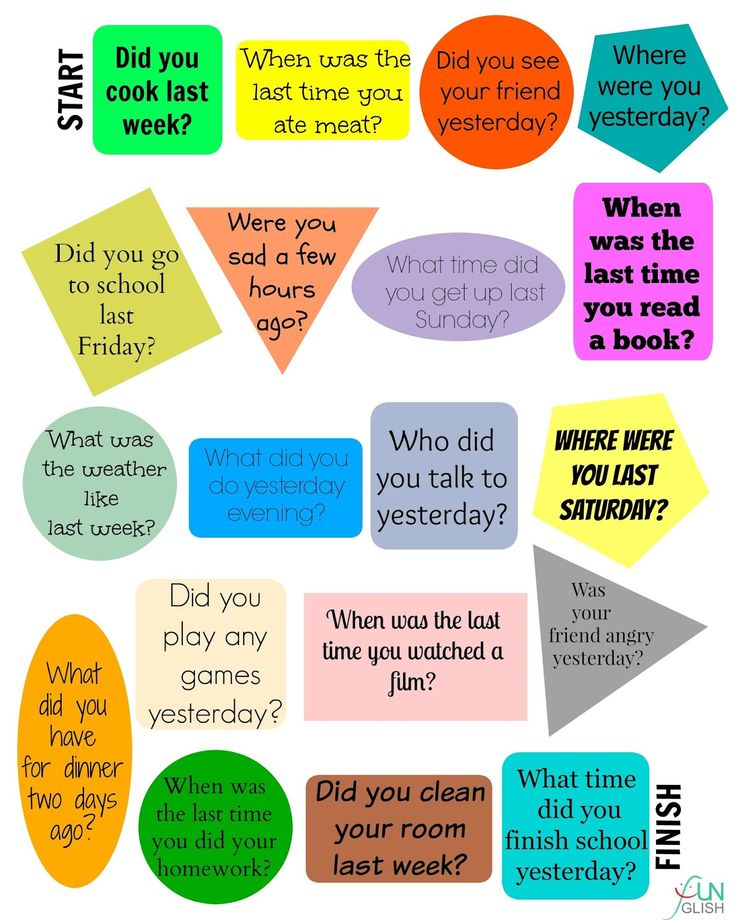 If they don’t want to pick a dandelion, they can always give their friends other types of flowers.
If they don’t want to pick a dandelion, they can always give their friends other types of flowers.
Pay for a friend’s school lunch
If you can swing it, give your child extra money one day to pay for a friend’s school lunch. You never know what another family is going through (financial hardship, a sick family member, etc.), so your child’s kind deed could make a big difference.
Help with homework
Everyone needs help with their homework once in a while. If your child excels in a subject, have them help one of their friends who may be struggling in that same subject.
Rebecca Nelson/Getty Images
Give a friend a high five
This act of kindness encourages your child to celebrate their friends’ accomplishments. Who doesn’t love getting a high five after a job well done?
Write a friendship poem
Words are powerful, especially in poetry. Your child can write a poem to a friend to express how much they value their friendship.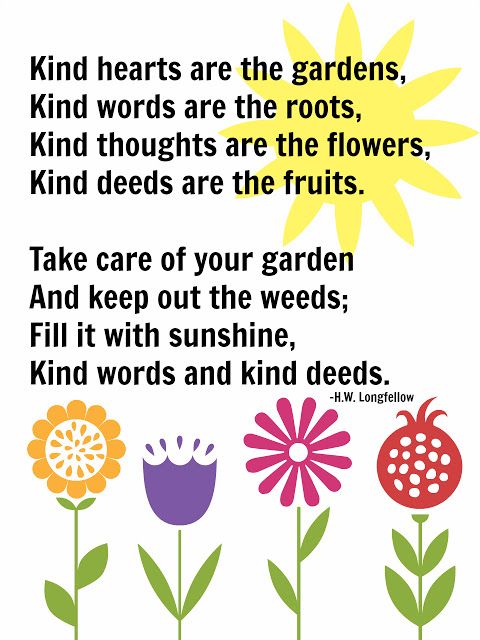 It’s a creative act of kindness that’s sure to inspire some smiles.
It’s a creative act of kindness that’s sure to inspire some smiles.
Is your child’s friend working on a project for school, or a special gift for a family member? If so, they can help their friend make it the best it can possibly be.
Random acts for kindness for neighbors
Make cookies for a neighbor
Kids love making and decorating cookies. Have them put a few extra on a plate to share with a neighbor or a friend. You can even add a note card with an uplifting quote.
Take a neighbor’s newspaper or package up to their porch
Newspapers, packages, and other items often get left at the end of the driveway or on lawns, and that puts them at risk of getting soggy or stolen. Kids can gently move them to a safe spot on the porch.
EvgeniiAnd/Getty Images
Shovel the sidewalk
Kids in snowy climes can shovel a neighbor’s driveway or sidewalk. In warmer weather, kids can rake leaves, offer to bag yard waste, or do another small outside chore that may feel hard for someone who is elderly, disabled, pregnant, or overwhelmed.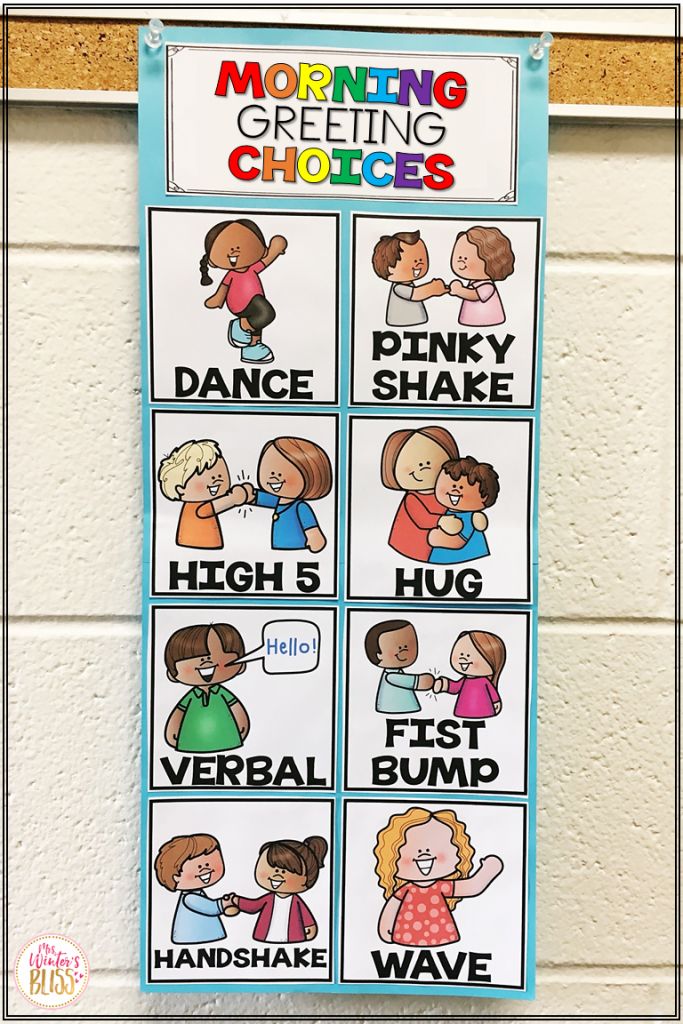
Give someone a “heart attack”
Have your child cut out paper hearts in various sizes and write sweet notes on them. Tape them to the door of someone who could use cheering up, then ring the doorbell and run.
Smile
A child’s smile is one of the most precious things in the world. Teach children to do it in a safe, comfortable way, and that smile could make a person’s whole day.
Make a candy poster
A piece of poster board, some markers, and a collection of candy can be turned into a thoughtful get-well, welcome-home, congratulations, or just-because message. If you have extra treats lying around, you can give them to Operation Gratitude, which sends care packages to our troops.
Take dinner to an elderly neighbor
If you end up with a little extra after dinner, have your kid box up a serving or two and take it to a neighbor who could use a hot meal but may not cook just for themselves.
Use polite manners
Kids can be more polite than we often expect them to be.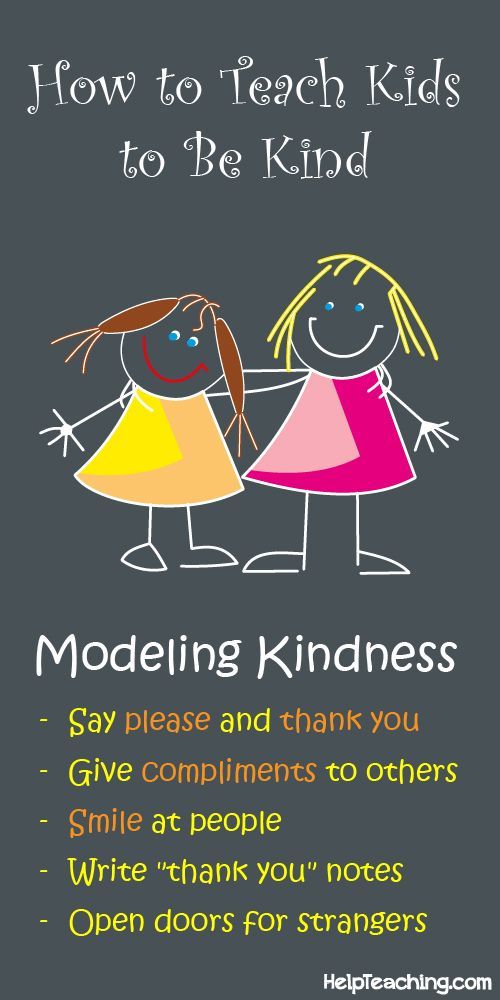 Saying “please” and “thank you” to both loved ones and neighbors is a simple way to show respect and kindness to others. Other kind phrases for kids may include “I’m so sorry!” and “How can I help?” Find out the daily habits of naturally polite people.
Saying “please” and “thank you” to both loved ones and neighbors is a simple way to show respect and kindness to others. Other kind phrases for kids may include “I’m so sorry!” and “How can I help?” Find out the daily habits of naturally polite people.
Random acts of kindness for teachers and classmates
Help the teacher put up chairs
Teachers do so much work outside of their normal classroom hours. One way kids can say thanks is to offer to help with some of those little things. Even very young kids can help pick up trash, stack chairs, put away supplies, or whatever their teacher needs.
SDI Productions/Getty Images
Eat lunch with someone who normally eats alone
Nearly everyone has a painful memory of eating alone in the school cafeteria. Teach your child to look for those who may be left out and kindly invite them to eat with them or join them at their table.
Ask another child to play at recess
Playing Groundies or tag or make-believe is so much more fun with friends.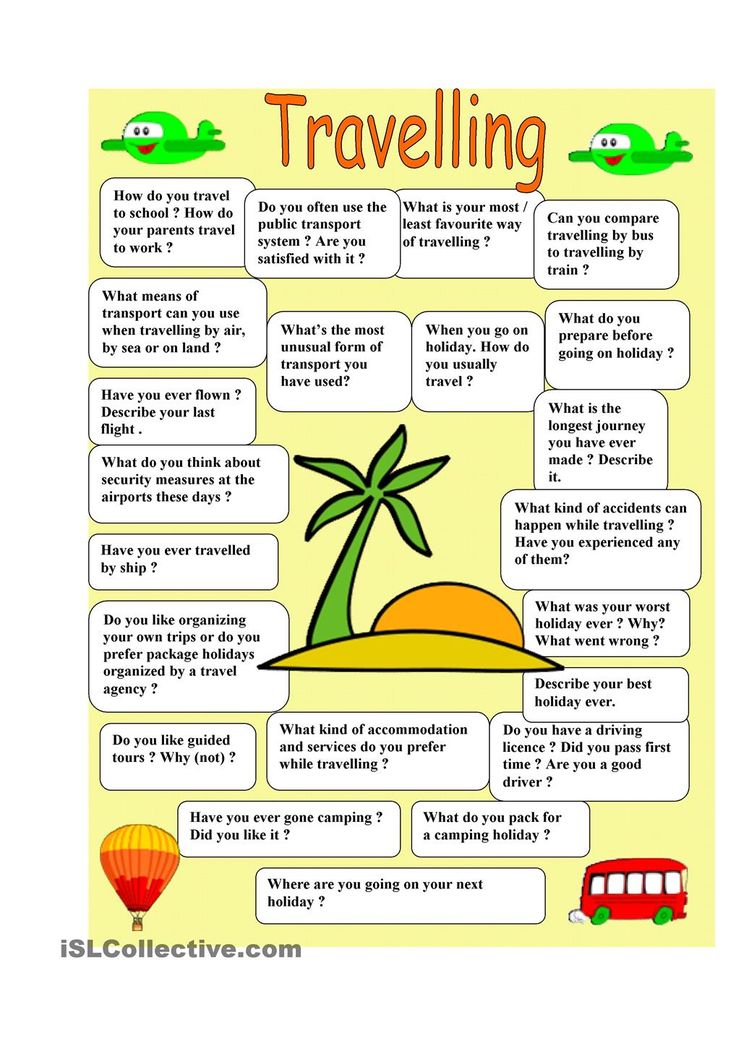 Encourage your kiddo to pay attention to those around him or her and invite them to play too.
Encourage your kiddo to pay attention to those around him or her and invite them to play too.
Have a used-sports-equipment drive
Many kids are kept out of playing sports because they can’t afford the necessary equipment, while other children have garages full of old equipment they no longer use. Help your child collect and donate these items to kids in need.
Tell someone they did a great job
Learning to recognize someone else’s hard work, effort, and accomplishment is a true kindness. Teach kids to see and commend others for doing good things, big or small.
SDI Productions/Getty Images
Talk to the new kid
Being the new kid in school is nerve-racking, but having a friend to show you the ropes can make things easier. Encourage kids to welcome new classmates by playing with them at recess and sitting with them during lunch (as long as the new student is OK with it, of course).
Volunteer to hand out assignments
This is a random act of kindness a teacher will surely appreciate.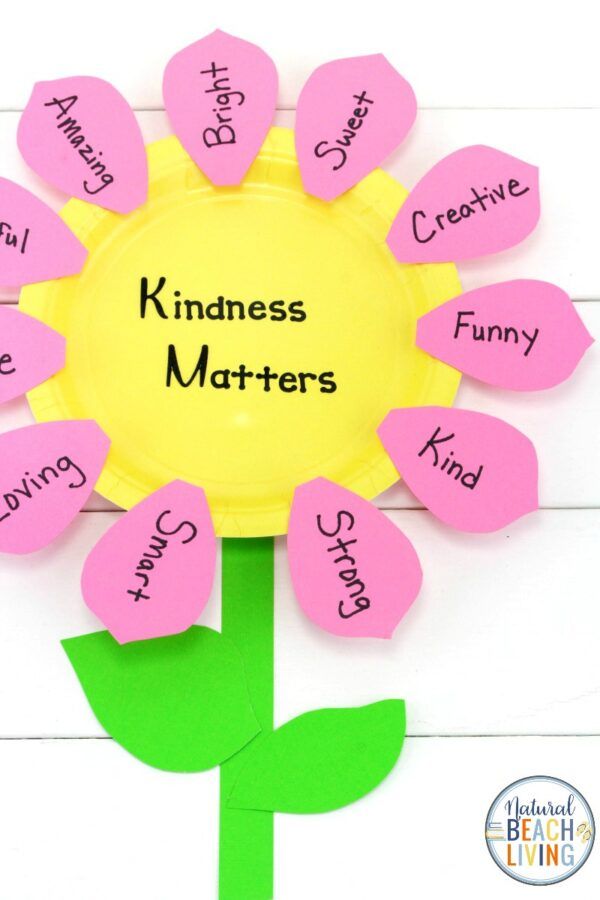 Kids can volunteer to help hand out classroom assignments and save their teacher a little time.
Kids can volunteer to help hand out classroom assignments and save their teacher a little time.
Random acts of kindness for the community
Decorate lunch bags for the food pantry
Many community kitchens and food pantries serve meals in paper bags or boxes to go. Kids can write kind messages, draw pictures (with non-toxic markers), and decorate them with stickers.
Put grocery carts back in the corral
Put some of that boundless energy to good use by having children retrieve rogue grocery carts left on sidewalks, in handicapped parking spots, or at the edges of the parking lot, and return them to the store or the cart corral.
Klaus Vedfelt/Getty Images
Donate old books
Have your child go through their gently loved books and choose some that they’ve outgrown to donate to a local library, community center, shelter, church, or school. Here are some more powerful ways to give to charity without breaking the bank.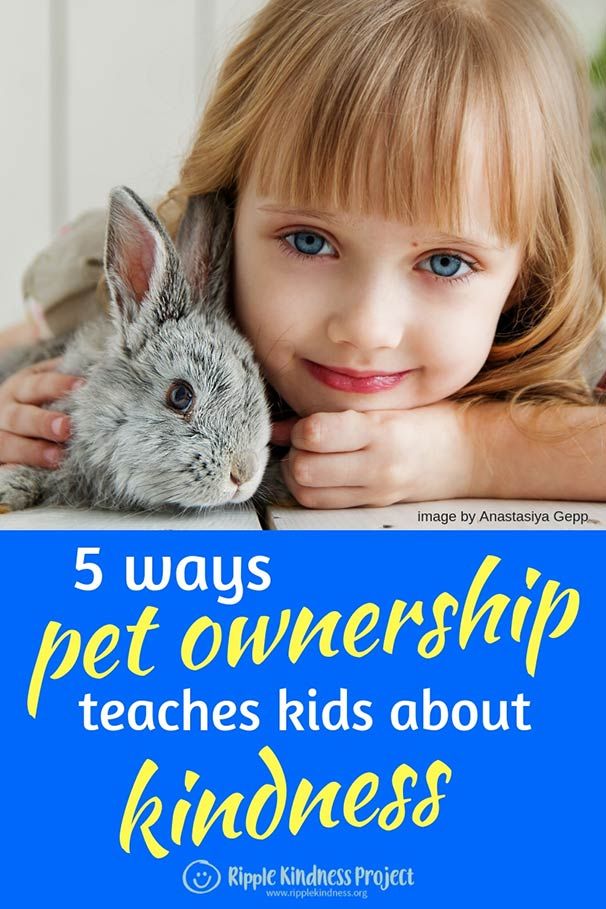
Make a snack basket for delivery people
Online orders are way up, and delivery folks are busier than ever. Help your child choose appropriate items—think bottled water or juice, granola bars, or prepackaged goodies—and make a basket with a sign letting delivery drivers know they’re welcome to take a snack for the road.
Write happy messages on sticky notes
Give your child a stack of sticky notes and some markers and let them fill the pad with happy pictures, kind messages, and compliments. Take the sticky pad with you during the day and let them put the notes where it can brighten someone’s day, like on a public bathroom mirror, a shelf at the store, a car window, or a sibling’s pillow.
Leave a basket of tennis balls or sticks at the dog park
Make a dog’s day (and their owner’s too!) by having your child collect old tennis balls or throwing sticks and placing them in a dog toy bin for everyone to enjoy.
Make cards or drawings for a retirement home
Many people in retirement homes feel isolated, and the pandemic only made that worse. Have kids draw pictures, make paintings, or write notes and deliver them to the elderly.
Hakase_/Getty Images
Give a thank-you card to a service worker
Pick a local teacher, cashier, bus driver, or other worker who helps you and your child on a regular basis and write them a sweet thank-you note. Go as simple or elaborate (glitter!) as your child likes. Hand-deliver the note for extra smiles.
Make homeless kits
Sample-sized toothpaste, shampoo, and deodorant can be put in a small Ziploc bag along with a toothbrush, comb, Band-Aids, and other sundry items. Children can help assemble these bags and hand them out to the house-less. One of the things no one tells you about being homeless is that hygiene items are worth their weight in gold.
Hang up fallen clothes at the store
Store hangers can be particularly slippery, and it’s not uncommon to see a few items piled on the floor. Show kindness to tired retail workers by hanging up a few.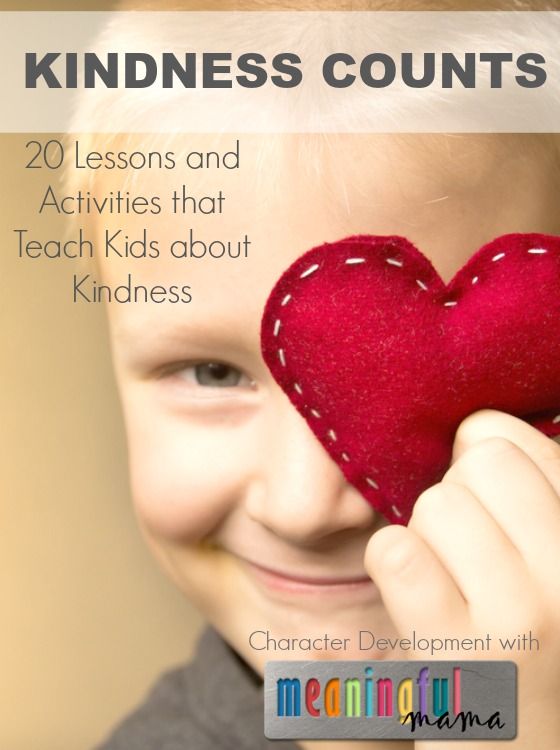
Donate toys to a children’s hospital
Have your child pick out a few of the season’s best toys and donate them to a local children’s hospital. Or organize a toy drive to make a larger community contribution.
Write letters to soldiers
Kids can write letters, draw pictures, and/or make care packages for the men and women who sacrifice so much to protect us every day.
Donate old blankets to a pet shelter
Bedding that you no longer use, even if it’s not in tip-top shape, can make the perfect bed for a dog or cat. Many shelters love getting donations of old blankets and towels, but always call first to make sure.
Eco-friendly random acts of kindness
Ride a bike instead of driving
Have a short errand to run? Turn it into a bike ride and show kindness to the planet by keeping the car at home. You can use it as an opportunity to discuss the importance of taking care of our environment in small but impactful ways.
Plant wildflowers
Many community gardens and nature centers offer packets of local seeds or at least suggestions of what to plant. Teach children about showing kindness to the environment through planting and nurturing wildlife.
Teach children about showing kindness to the environment through planting and nurturing wildlife.
Westend61/Getty Images
Pick up litter at a local park
Make it a game by creating a scavenger-hunt list—a soda can, a candy wrapper, a fast-food bag—and see how fast your child can find them all. Check out more ways you and your kids can help save the planet in five minutes or less.
Collect recycling and take it to a drop-off center
Kids can easily collect tin cans and plastic bottles at home or at school, then bring them to a nearby recycling center (with your help, of course).
Make a pine-cone bird feeder
This random act of kindness for kids is intended to help Mother Nature. Take a pine cone, cover it in peanut butter, roll it in birdseed, and hang it from a nearby tree. Birds will enjoy the treat, particularly in the wintertime, and you can use it to teach your kiddo about the different types of wildlife in your area.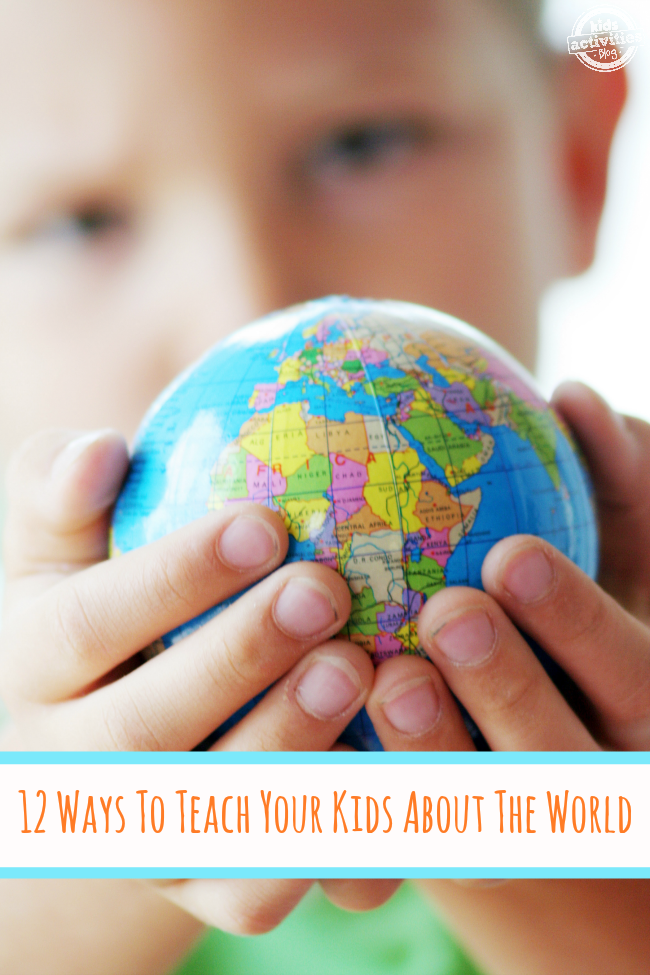
Popular Videos
ⓘ
We want our children to be kind. Can they be taught this?
If parents really appreciate kindness in people, there are many ways to bring it up in a child
November 13 is World Kindness Day in many countries. The participants of the holiday call on all the inhabitants of the planet to do some good deed on this day. But is it possible to make it so that doing good becomes a habit, and we do good deeds every day, and not just once a year? There are several ways to become kinder yourself and teach your children to do the same.
A person's character is formed before the age of 5, according to psychologists. It is good if before this age adults managed to lay the foundations and instill good habits in the child. This also applies to moral qualities. Parents can teach their child not only to brush their teeth, dress themselves, read and count confidently, but also to be kind! Kindness is not only a character trait, often innate from birth, but also a habit of behaving and treating others kindly, which can be instilled in a child in childhood and developed later throughout life.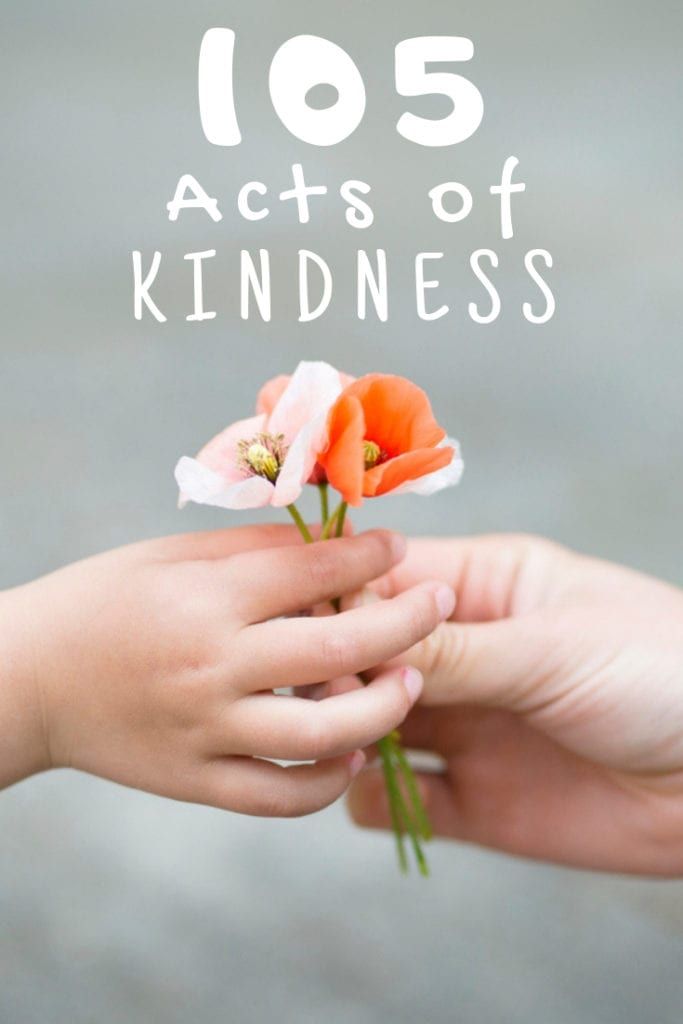
How to show a child what kindness is, what actions we consider good and why? Recall 10 affordable ways to make acts of kindness a natural part of your children's lives.
1. Be an example. No common truths will be learned if the child does not see their application in practice. The brain of a small child is set to imitate. Children reproduce in behavior only those models that they see in front of them. You must be an example if you want your child to be kind to himself and others. The most valuable observation for a baby is to see how mom or dad helps a stranger on the street, in a store, in transport.
2. Don't be afraid to talk to a stranger. You can always exchange a couple of kind words with a salesperson in a store, with fellow travelers on a bus, with strangers who find themselves next to you in some general situation. Treat them kindly, like old friends. Communicate freely and with a smile.
3. Show love and affection towards your loved ones.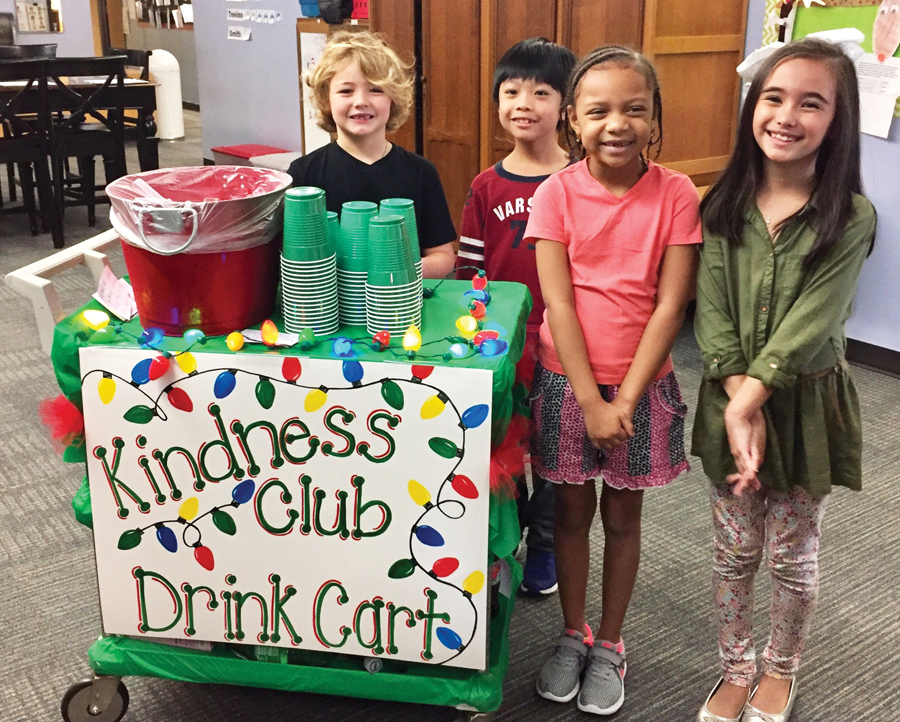 Hug, kiss each other and the child more often, prepare pleasant surprises, say kind words, and then the children will begin to behave in the same way. A child raised in a warm, welcoming environment learns empathy faster.
Hug, kiss each other and the child more often, prepare pleasant surprises, say kind words, and then the children will begin to behave in the same way. A child raised in a warm, welcoming environment learns empathy faster.
4. Read books and watch movies about kindness. Discuss what you see and hear with your child. Talk about what is good and what is bad. Such shared moments teach children to understand situations and people.
- Eduard Uspensky "Fur boarding school" (Kid, 2019). A funny and touching story about a girl, Lyusya Bryukina, who unexpectedly turned out to be a teacher for a whole class of cute animals. Illustrations by Victor Chizhikov.
- Jutta Langreuther "It's better at home!" (Polyandria, 2013). A tender tale about love and the indispensability of a mother.
- Sam McBratney "Do you know how much I love you?" (Pink giraffe, 2019). How to explain what love is? Try to find the answer.
- "Girl and Fox" (France, 2007).
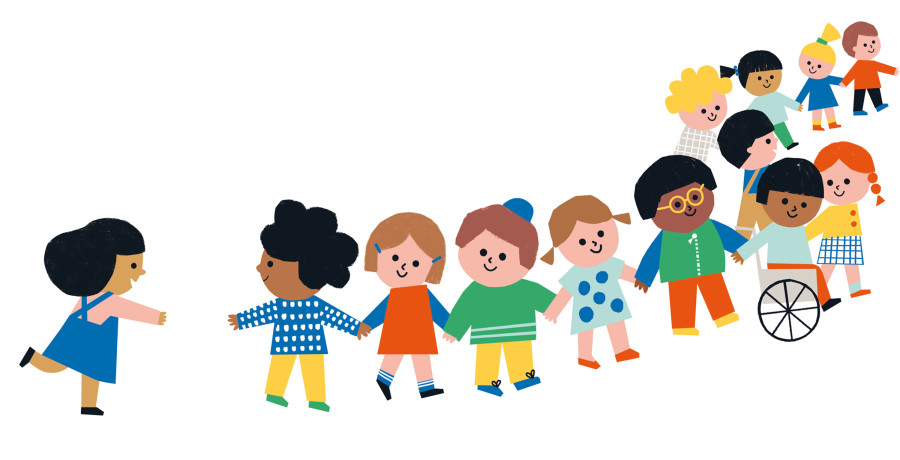 A film about what can be sacrificed for the sake of love and friendship.
A film about what can be sacrificed for the sake of love and friendship. - Dolphin Story (Canada, USA, 2011). Dolphins are clearly smarter than humans. They can teach compassion, perseverance, and optimism.
- "We bought a zoo" (USA, 2011). Buy a zoo and save the animals. Or will they save you?
- Paddington Adventures (UK, France, USA, 2014). The teddy bear turns out to be a beloved member of the family and gets everyone involved in unexpected challenges.
5. Teach the children to help each other. And not only in some acute situation, when help to another is urgently needed. It will be great if the child learns to show his participation in everyday things. Teach your child various useful skills that he could share with others. You will teach him how to make Easter cakes, and he will show how it is done to other children on the playground.
6. Pay attention to your baby's actions. Every person is pleased when he is appreciated, and especially a child. The kid really wants his parents to celebrate his achievements and good impulses and be proud of him! This not only gives pleasure, but also helps to build a system of reference points. Children love to analyze and reflect. If a child does a good deed and receives feedback, after a while he will definitely want to repeat this action again. So good deeds will gradually become a habit.
7. Explain your actions. When you say, "I'm staying at a friend's tonight," be sure to add "because she asked me to babysit her little daughter while no one was home." Children need to understand why you act this way and not otherwise.
8. Tell your child about volunteering. Explain who volunteers are and why they help others for free. Together with your child, you can clean up garbage in the park, feed homeless animals. Invite your child to donate some of their toys to the orphanage. If you help charities or participate in volunteer projects, explain to your child why this is important to you and what your help is about.
9. Come up with a reward system. For example, earning cotton balls! It's extremely simple, but very effective. Put in a prominent place (for example, in the kitchen) a jar in which the child will put cotton balls “earned” for good deeds and deeds. Balls are not issued for the performance of any duties or for housework.
The child receives them only when he does something that he was not asked to do, something pleasant and unexpected. Usually this process turns into an exciting game.
What can I give a ball for? If one child spills their food/drink and another helps clean up (without asking!). If the parent needs to bring something, and the children will follow him to help (without asking). If children do or say kind things to each other or to someone else.
The reward for collected marbles must not be material. It is better to organize some kind of fun event. Go bowling with dad, or go to the movies with mom, or maybe just a sleepover party in the parent's bedroom on the floor in sleeping bags!
Cotton balls can be taken back as a punishment: for example, if a child has been rude or aggressive towards another person.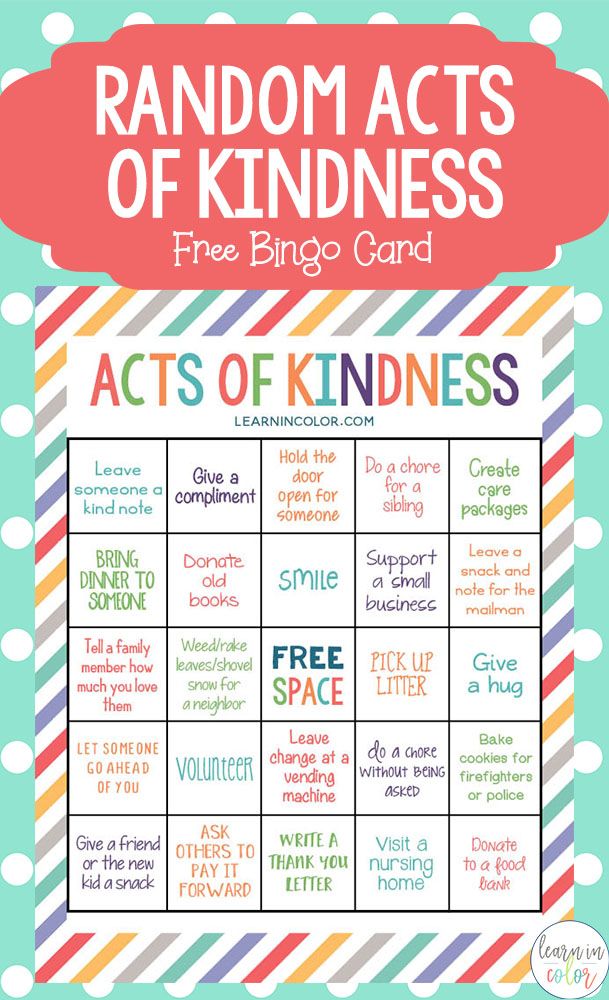 The threat of losing the ball is also a good incentive to control your behavior.
The threat of losing the ball is also a good incentive to control your behavior.
10. Do not judge other people in front of children. Today, public discussions of celebrities or even ordinary people who have attracted public attention are widespread. Being unkind to others is nothing new. But just today, people began to condemn each other easily, thoughtlessly and anonymously. Children who live and develop in the world of digital technologies and social networks learn this very quickly.
Remember that your conduct must be honest and consistent. You need to teach good deeds at any age and you can start with the simplest - do not forget to say hello to your neighbors, make a bird feeder and make sure that there is food in it all the time, and just smile at other people. These are trifles, but it is precisely such regular work that will help children grow up different, constantly show kindness, and this will not just be a habit, but a way of life.
Kindness Lessons for the Child - Child Development
Today's world needs kindness more than ever before.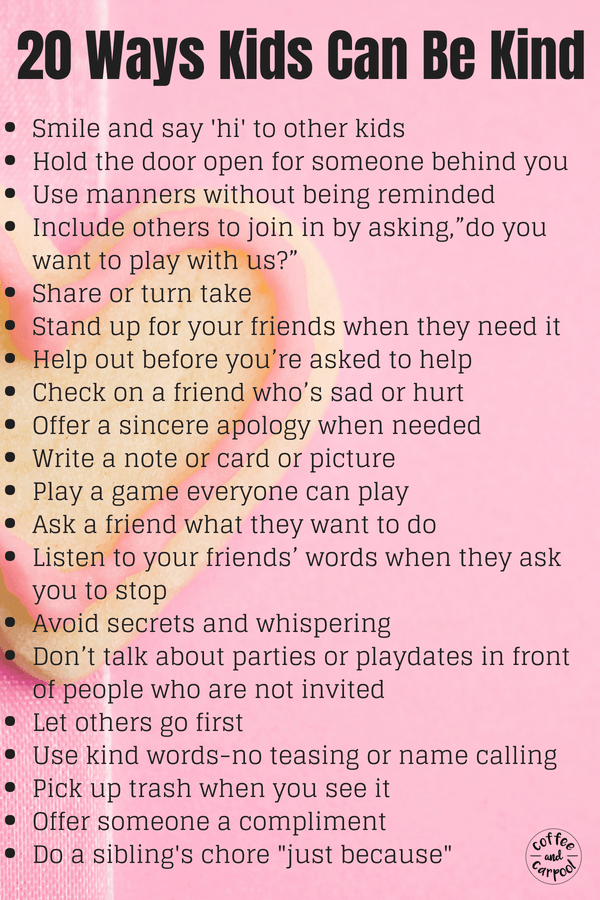 On TV and from the Internet, we are bombarded with negative information and news that terrifies us. New trends in modern culture, approaches to raising children and technological progress contribute to the fact that people are obsessed with themselves.
On TV and from the Internet, we are bombarded with negative information and news that terrifies us. New trends in modern culture, approaches to raising children and technological progress contribute to the fact that people are obsessed with themselves.
We attach great importance to raising our children to be successful in school, sports, the arts, or any other area. We are focused on ensuring that the child gets good grades in school and enters a prestigious university. Kindness and compassion are no longer a priority. However, it is the ability to empathize and emotional intelligence that make the child more resilient, develop his leadership qualities and high performance. Therefore, parents need to instill these qualities in their child.
Kindness and sympathy is the foundation that makes society civilized. These are strong feelings that can withstand cruel and violent behavior.
Psychologists say that children are born with the ability to empathize and show it from an early age, but this ability must be developed.
You don't have to wait for your child to be taught at school about the need to be kind and caring to others. Talk to your child about kindness yourself. Ask him questions that will help him understand why it is necessary to give without demanding anything in return.
1. Ask the child: "Would you rather make a friend a special birthday present or surprise them with something special for no reason?"
Why is this important? Every child wants to be remembered on the important days of his life. But even more, he likes to be remembered simply as a good friend, for no particular reason.
What should be done after that? Encourage your child to be kind and caring. Any spontaneous, unexpected gesture of kindness (such as an encouraging text message, a phone call, or an unscheduled visit) is a good way for a child to show that they care about their friends.
2. Ask the child: "Which would you rather be in another country on a volunteer mission or help people in your home town?"
Why is this important? You will understand whether the child has a desire to travel and explore the world, or he prefers to be useful in his hometown for patriotic reasons.
What should be done after that? Talk to your child about volunteering in a foreign country and in an unfamiliar environment. Ask him if he will take up the job with enthusiasm when he is in another country, or will he miss home? If a child prefers to be useful in his homeland, tell him how he can be useful to others.
3. Ask the child: “If you baked your own cookies, would you give them to the fireman or the postman?”
Why is this important? It is important to explain to the child that not only people of heroic professions, which we often hear about from the news (for example, policemen or firefighters), are equally important, but also people of seemingly invisible professions that make our life more comfortable.
What should be done after that? Help your child think of ways to thank people who do a good job without being seen.
4. Ask the child: "Which would you rather donate clothes to an orphanage and never see how your clothes bring joy to others, or give food to the homeless and see the benefit of your work?"
Why is important ? There are many ways to help others.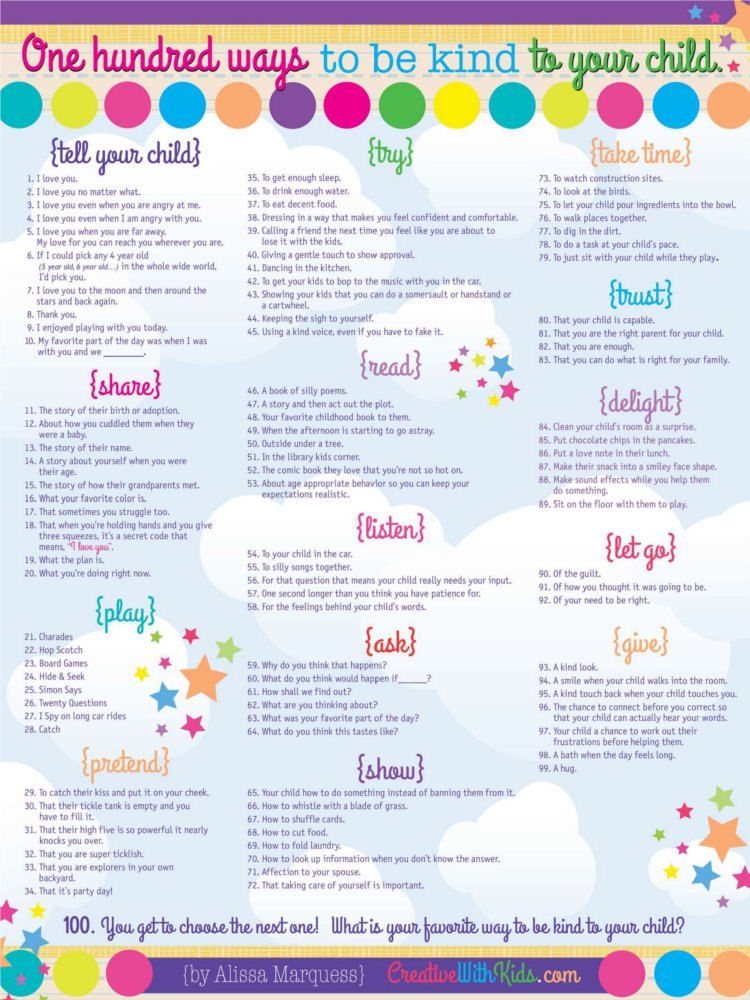 Some of them children find more useful and practical than others. Regardless of which method your child chooses, it is important to explain to him that any help to others is important.
Some of them children find more useful and practical than others. Regardless of which method your child chooses, it is important to explain to him that any help to others is important.
What should be done after that? Give your child the opportunity to try different activities and find what brings him pleasure, as well as what he himself sees the meaning. For example, he may enjoy volunteering if he sees the benefits of his work. Sometimes such inspiration and dedication is enough to make a childhood hobby a matter of a lifetime.
5. Ask the child: "Which would you prefer: collecting money to help someone you know or collecting things for humanitarian aid to people affected by a natural disaster?"
Why is this important? Explain to your child what it means to raise funds for people you know who are in difficulty. Tell him that strangers may also need sympathy and help.
What should be done after that? The next time you do charity work, take a child to help you.